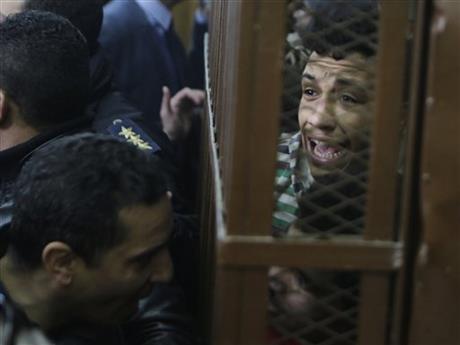An Egyptian court on Monday acquitted 26 men arrested in a televised raid last month by police looking for gays at a Cairo public bathhouse, a ruling that set off deafening cheers and jubilation inside the courtroom as some of the defendants uncovered their faces and wept openly in relief.
Others, however, kept their faces hidden behind jacket hoods and scarves, still traumatized by the humiliation they and their families had endured during the highly publicized case, which caught the public’s attention after a pro-government TV network aired scenes of half-naked men being pulled from the bathhouse by police during the Dec. 7 raid.
Monday’s ruling was a climax in Egypt’s ongoing crackdown on the gay community, and also recently on atheists — a crackdown that goes hand in hand with a wider campaign against all forms of dissent and diversity in a country gripped by rising nationalism and a militant insurgency.
Same-sex relations are not explicitly prohibited under Egyptian law but homosexuality is a social taboo in the conservative, Muslim-majority country and same-sex marriage is unheard of. Only in recent years have movies and fiction included gay characters.
“They destroyed our lives. God rescued us,” said one of the defendants, who would not give his name to protect his privacy, as he broke into tears after the verdict.
Scenes of half-naked men being dragged from the bathhouse after police descended on the hammam in a narrow alley of an old downtown Cairo district caused an uproar among activists and rights groups.
Activists, defendants and their families were doubly outraged by the deep involvement in the case of Egyptian TV presenter Mona al-Iraqi, who claimed she actually triggered the raid by tipping off the police about alleged gay activity in the bathhouse — which she described as a “den of mass perversion spreading AIDS in Egypt.”
The men faced various charges, including debauchery and performing indecent public acts. Monday’s verdict came after only four hearings, during which families quarreled with journalists who tried to photograph their relatives in the dock.
The courtroom erupted into a frenzy after the word “acquittal” was heard from the judge and women ululated. Several defendants inside the cage and their relatives vowed to seek legal action against al-Iraqi.
Scott Long, an American researcher who had followed the case said he was both “shocked and delighted” by the outcome.
“I hope this is a sign that these raids will come to an end,” Long told The Associated Press in the courtroom. “Finally, there was a judge who listened to the evidence.”
The acquittal came less than a month after an appeals court reduced prison sentences from three years to one for eight men convicted of “inciting debauchery” for appearing in an alleged same-sex wedding video. Rights activists say 2014 was the worst year in a decade for Egypt’s gay community, with at least 150 men arrested or put on trial.
Activists also say that by cracking down on gays, President Abdel-Fattah el-Sissi’s government seeks to boost its credentials as a protector of morals and religious values in a perceived rivalry with the Muslim Brotherhood and other Islamists. El-Sissi led the ouster of Islamist President Mohammed Morsi in 2013, and since then, security forces have all but crushed the Brotherhood, arresting more than 20,000 and killing hundreds as they put down Islamist protests. The government has also arrested secular opposition figures in a move to silence dissent.
During the case, pro-government media have whipped up reports of alleged threats to society from outsiders, whether foreign plotters, homosexuals, atheists or devil worshippers.
One of the defendants’ attorneys, Ahmed Hossam, said the media “convicted” the defendants before they even set foot in court.
Because there are no laws criminalizing homosexuality in Egypt, a decades’ old law criminalizing prostitution is often used in penalizing the gay community. The trial opened only two weeks after the raid on the bathhouse — an usually quick referral by the general prosecutor.
Five of the defendants — the owner of the bathhouse and four staff members — were tried for facilitating debauchery in exchange for money.
In the official charges, the prosecutor claimed the investigation revealed the owner and the staff ran the bathhouse as a place for “parties of debauchery, orgies among male homosexuals in exchange for money.”
The rest of the defendants were charged with practicing debauchery and “indecent public acts.”
The lawyers representing some of the defendants said their clients faced an unprecedented ordeal while in hands of security authorities, mainly because of the stigma associated with being suspected as a gay in Egypt.
Hossam, the lawyer, also criticized the police for subjecting the defendants to an “inhuman” forensic investigation that produced a “vague and incomplete” report that cited “scratches” as indication of possible homosexual activity.
“These men lost everything,” said Hossam, who represented 14 of the defendants. “Even with acquittal, this conservative, regressive society will continue to scorn them. Their lives and their families have been shattered.”




